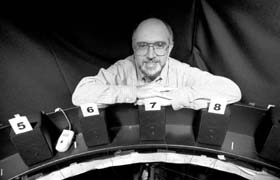
| ||
 | ||
 Dr. Robert Zatorre with speakers he uses in his experiments with research subjects PHOTO: OWEN EGAN |
Probing a musical superpower
|
KEVIN HALL | Superman can hear the scream of Lois Lane from miles away, but can he tell if her shrill cry is a B flat or an A? If so, then he possesses yet another superpower called perfect pitch.
It won't help him save the world from the forces of evil, but it could earn him a place in the Metropolis city orchestra. Perfect pitch is a rare gift possessed by few musicians and coveted by many. Most trained musicians have a skill called relative pitch that enables them to identify the musical interval between two tones, but, unlike those with perfect pitch, they cannot name the individual notes. "[Perfect pitch] is an ability that only a small proportion of people have and it seems to violate the standard assumptions about perception," says Montreal Neurological Institute neuropsychologist Robert Zatorre. He is studying what goes on inside the heads of "perfect pitchers" using brain scans. "Something interesting must be happening in the brain that allows those people to make that kind of judgment," says Zatorre. Zatorre uses positron emission tomography (PET) to identify the parts of the brain that are active when musicians attempt to identify absolute pitches and musical intervals. He found that people with perfect pitch use their brains differently than other musicians. "There was a really huge, striking difference!" says Zatorre. When the musicians were asked to identify the pitch of an individual note "an area … in the left frontal lobe was massively activated in those with perfect pitch, but was completely quiescent in the other subjects." Since only the perfect pitchers correctly named the note, Zatorre concluded that this region of the brain was the source of the superpower. The left frontal lobe is believed to be related to what psychologists call associative memory. Zatorre explains, "Associative memory is the ability to link a sensory event with some kind of internal label." So a musician with perfect pitch uses the specialized neural circuitry in the left frontal lobe to link a sound with its associated musical name. Those without perfect pitch have no such association and therefore do not use that part of the brain. However, all musicians use the same associative memory circuitry to identify the musical interval between two tones. "This suggests that people with perfect pitch don't have an entirely different neuroanatomy. It's just that [their associative memory circuitry] is more finely tuned so that they are able to use it in a more difficult situation," says Zatorre. None of this explains why people with perfect pitch have such a finely tuned associative memory mechanism, but it is likely due to a complex interaction between nurture and nature. A group of researchers from the University of California at San Francisco have found a genetic basis for perfect pitch -- but having the right genes is not enough. "If you don't get the right musical training at the right time, then it's gone," says Zatorre. Zatorre plans to collaborate with genetics researchers to study how genes influence the function of the brain -- and ultimately, behaviour. "That would be exciting because there are few situations [that establish] a genetic link … to human behaviour," says Zatorre. And unlike attributes like intelligence, "perfect pitch is very well defined, easy to test for, and doesn't involve anything that is ethically questionable." So, what could stand in the way of such fascinating research? Zatorre explains by singing the familiar tune of the modern scientist: "This is the sort of [research] that is really hard to fund since it's not going to cure a disease and there is no immediate application." Perhaps, but his work on perfect pitch has struck the right chord for science journalists who've sought him out for interviews. "I've gotten more publicity for this study than almost anything else I've ever done!"
|
|
| |||||